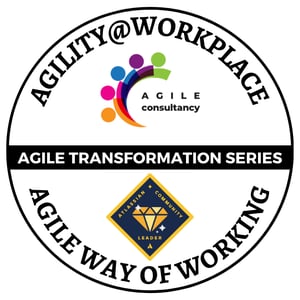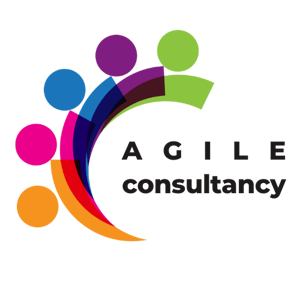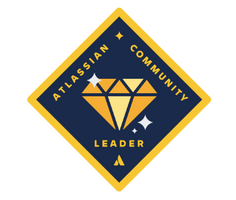AGILE TRANSFORMATION SERIES
OPERATIONAL Agility
adopt the right mindset to START your Agile journey

AGILITY@WORKPLACE: AGILE WAYS OF WORKING
The Most Flexible and Comprehensive Adaptation of Agile Best Practices for Individuals & Teams
Course Overview
This course equips learners with knowledge, skills, attitudes and techniques to thrive in VUCA (volatile, uncertain, complex, and ambiguous) environments by adopting Agile Way of Working. Learners will learn to manage thoughts and emotions effectively in challenging situations, demonstrate self-organization and teamwork, and acquire new knowledge rapidly. Emphasis is placed on fostering innovation, continuous improvement, and risk management. Additionally, learners will develop their very own bespoke strategies for effective conflict resolution and stakeholder engagement, ensuring collaborative outcomes and significant performance enhancements.
Learning Outcomes
1. Develop measures to embrace VUCA (volatile, uncertain, complex, and ambiguous) environments at the workplace by adopting Agile Way of Working.
2. Demonstrate the ability to manage thoughts and emotions in challenging situations, showing adaptability and resilience in navigating changing emotional landscapes.
3. Demonstrate proficiency in self-organising and self-directing within teams to achieve goals and exhibit a readiness and capability to acquire and apply new knowledge and skills in diverse contexts.
4. Develop skills in generating innovative ideas and practices, continuously improving, and managing risks effectively in a dynamic environment.
5. Demonstrate ability to navigate conflicts effectively using adaptive strategies and engage stakeholders efficiently, ensuring collaborative and constructive outcomes in VUCA environments.
Target Audience:
> Technical and Non-technical teams, including front-line managers and C-level executives, are keen on embarking and leveraging the benefits of Agile Ways of Working.
> Potential roles impacted by this training include but are not limited to, Executives and Professionals
Course Pre-requisite:
- None
-
Achieves Learning Outcomes 1
-
Understanding the characteristics and challenges of VUCA (volatile, uncertain, complex and ambiguous) environments
-
Achieves Learning Outcome 2
-
The ability to respond to channel and direct one’s thoughts and feelings work for them during challenging situations
-
Achieves Learning Outcome 3
-
The ability to navigate and manage one's emotions effectively and adapt to changing emotional situations
-
Achieves Learning Outcome 3
-
The capacity of individuals in teams to self-organise and self-direct to achieve their goals perpetually
-
Achieves Learning Outcome 3
-
The willingness and ability of individuals and teams to acquire new expertise quickly and apply it in different contexts.
-
Achieves Learning Outcome 4
-
Developing skills in fostering innovation and creativity, including generating new ideas and best practices, grooming them, and bringing them to life.
-
Achieves Learning Outcome 4
-
Developing skills in agility and adaptability, including how to pivot quickly, respond to changing market conditions, and manage risk effectively.
-
Achieves Learning Outcome 5
-
Navigate conflicts effectively in volatile, uncertain, complex, ambiguous environments through adaptive strategies for resolution and collaboration
-
Achieves Learning Outcome 5
-
The art of understanding how to engage stakeholders
-
Achieves Learning Outcome 4
-
Undertake team reflection for continuous improvement
-
Achieves Learning Outcome 4
-
Undertake individual reflection for continuous improvement
-
Achieves Learning Outcome 1
-
Immersive application of Agility@Workplace: Agile Ways of Working based on a real-life case study
Delivered by Atlassian Community Leader
Course Includes:
- Duration: 3 Days
- Contact Hours: 21
- Mode of Delivery: Online / Onsite
- Post-Training Engagement: Yes
- Certificate: Yes
-
Trainer:
Atlassian Community Leader, PMI-ACP & Enterprise Agile Coach
-
Capacity:
8 pax (min) to 20 pax (max) for maximum value & engagement
INDUSTRIES IMPACTED BY THIS COURSE
|
OUR COMPLETE LIST OF SERVICE OFFERINGS
| MENTAL AGILITY |
| Mental Agility@Workplace |
| LEADERSHIP |
| AGILE for OPERATIONS TEAMS |
| AGILE for PROJECT TEAMS |
|
AGILE COACHING |
| AGILE CERTIFICATION |
|
Certified Agile Mindset with Jira Software Certified Agile Project Management Practitioner Certified Agility@Workplace Practitioner |
| KNOWLEDGE MANAGEMENT |
| DESIGN FOR ENGAGEMENT |
| Design for Engagement: Captivate your Audience with Ease |



